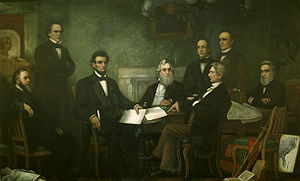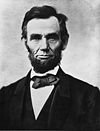- Montgomery Blair
-
Montgomery Blair 
20th United States Postmaster General In office
March 5, 1861 – September 24, 1864Preceded by Horatio King Succeeded by William Dennison, Jr. Personal details Born May 10, 1813
Franklin County, KentuckyDied July 27, 1883 (aged 70)
Silver Spring, Maryland, U.S.Political party Republican, Democratic Spouse(s) Mary Elizabeth Woodbury Blair Alma mater United States Military Academy Profession Lawyer, Politician Military service Service/branch United States Army Battles/wars Seminole War Montgomery Blair (May 10, 1813 – July 27, 1883), the son of Francis Preston Blair, elder brother of Francis Preston Blair, Jr. and cousin of B. Gratz Brown, was a politician and lawyer from Maryland. Despite belonging to a prominent slaveholding family, Blair was an abolitionist and a loyal member of the Cabinet of Abraham Lincoln during the American Civil War. Blair was hot-tempered, and in 1864 he launched an all-out attack against Republican liberals.[clarification needed]
Contents
Life
Blair was born in Franklin County, Kentucky. His father, Francis P. Blair, Sr., was, as editor of the Washington Globe, a prominent figure in the Democratic Party during the Jacksonian era, and as a boy Montgomery "often listened to the talk of his father and Andrew Jackson."[1] Blair graduated from the United States Military Academy in 1835, but after a year's service in the Seminole War, he left the Army, studied law, and began practice at St Louis, Missouri. After serving as United States district attorney (1839–43) and as judge of the court of common pleas (1834–1849), he moved to Maryland in 1852 and devoted himself to law practice principally in the United States Supreme Court. He was United States Solicitor in the Court of Claims (1855–58) and was associated with George T. Curtis as counsel for the plaintiff in the Dred Scott v. Sandford case of 1857.
First Reading of the Emancipation Proclamation of President Lincoln by Francis Bicknell Carpenter[2]Use your cursor to see who is who
The Blairs, like many other nationalist Democrats, but unusually for politicians from the border states, had abandoned the Democratic Party in the wake of the Kansas-Nebraska Act and had been among the founding leaders of the new Republican Party. In 1860 Montgomery Blair took an active part in the presidential campaign on behalf of Abraham Lincoln. After his election, Lincoln invited Blair to be part of his cabinet as Postmaster-General. Lincoln expected Blair, who advocated taking a firm stance with the southern states, to help balance more conciliatory members of his cabinet.[3] Blair served as Postmaster-General from 1861 until September 1864, when Lincoln accepted an earlier offer by Blair to resign. Lincoln's action may have been a response to the hostility of the Radical Republican faction, who stipulated that Blair's retirement should follow the withdrawal of John C. Frémont's name as a candidate for the presidential nomination in that year. Regarding Lincoln's action, Blair told his wife that the president had acted "from the best motives" and that "it is for the best all around." After he left the cabinet, Blair still campaigned for Lincoln's re-election and Lincoln and the Blair family retained close ties.[4]Under Blair's administration, such reforms and improvements as the establishment of free city delivery, the adoption of a money order system, and the use of railway mail cars were instituted — the last having been suggested by George B. Armstrong (d. 1871), of Chicago, who from 1869 until his death was general superintendent of the United States railway mail service.
Differing from the Republican Party on the Reconstruction policy, Blair gave his adherence to the Democratic Party after the Civil War, along with his brother, who was the Democratic vice presidential candidate in 1868.
His manor in present-day Silver Spring, Maryland was named Falkland. It was burned by Confederate troops during their thrust towards Washington, D.C. He died at Silver Spring. Montgomery Blair's wife was Mary Woodbury, a daughter of Levi Woodbury. Together, they were the great-grandparents of actor Montgomery Clift.
Works
- Speech on the Causes of the Rebellion (1864)
Honors
Montgomery Blair High School in Silver Spring, Maryland.
Gallery
-
Lincoln met with his Cabinet for the first reading of the Emancipation Proclamation draft on July 22, 1862.
Publications
Notes
- ^ Allan Nevins, The War for the Union, vol. 1: The Improvised War, 1861-1862 (New York: Charles Scribner's Sons, 1959), p. 43.
- ^ Reference. Lincoln met with his cabinet on July 22, 1862 for the first reading of a draft of the Emancipation Proclamation. Sight measurement. Height: 108 inches (274.32 cm) Width: 180 inches (457.2 cm)
- ^ Goodwin, 2005, Chapter 11.
- ^ Goodwin, 2005, Chapter 24.
References
 This article incorporates text from a publication now in the public domain: Chisholm, Hugh, ed (1911). Encyclopædia Britannica (11th ed.). Cambridge University Press.
This article incorporates text from a publication now in the public domain: Chisholm, Hugh, ed (1911). Encyclopædia Britannica (11th ed.). Cambridge University Press.- This article incorporates text from an edition of the New International Encyclopedia that is in the public domain.
- Goodwin, D. K. Team of Rivals: The Political Genius of Abraham Lincoln. New York: Simon & Schuster, 2005. ISBN 1-4165-4983-8 (electronic edition).
External links
- Biography
- Mr. Lincoln and Friends: Montgomery Blair
- Mr. Lincoln and Freedom: Montgomery Blair
- Mr. Lincoln's White House: Montgomery Blair
- Montgomery Blair at Find a Grave
Political offices Preceded by
Horatio KingUnited States Postmaster General
Served under: Abraham Lincoln
1861 – 1864Succeeded by
William Dennison, Jr.United States Postmasters General Confederal 
Federal Cabinet level Barry · Kendall · Niles · F. Granger · Wickliffe · Johnson · Collamer · Hall · Hubbard · Campbell · A. Brown · Holt · King · Blair · Dennison · Randall · Creswell · Marshall · Jewell · Tyner · Key · Maynard · James · Howe · Gresham · Hatton · Vilas · Dickinson · Wanamaker · Bissell · Wilson · Gary · Smith · Payne · Wynne · Cortelyou · Meyer · Hitchcock · Burleson · Hays · Work · New · W. Brown · Farley · Walker · Hannegan · Donaldson · Summerfield · Day · Gronouski · O'Brien · Watson · Blount
U.S. Postal Service Categories:- 1813 births
- 1883 deaths
- People from Franklin County, Kentucky
- United States Military Academy alumni
- People of the Seminole Wars
- Maryland state court judges
- United States Attorneys
- United States Postmasters General
- American political writers
- People of Maryland in the American Civil War
- Union political leaders
- Burials at Rock Creek Cemetery
- Maryland Democrats
- Maryland Republicans
Wikimedia Foundation. 2010.




